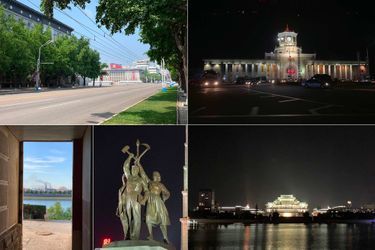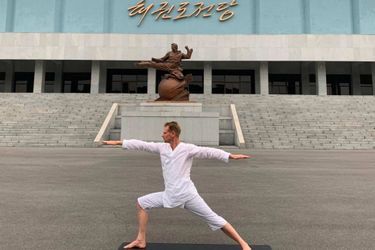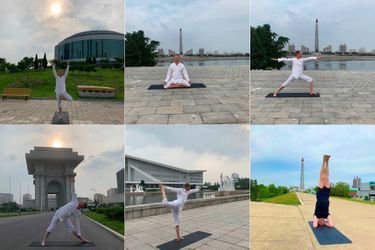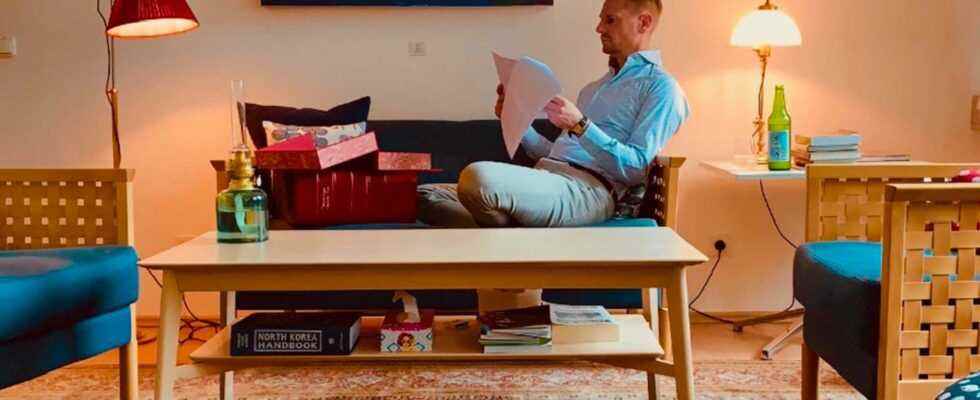Swedish diplomat Joachim Bergström served as ambassador to North Korea. He tells Paris Match this year in an extraordinary country.
Being assigned to North Korea, Joachim Bergström dreamed of it. This former journalist turned diplomat, holder of a doctorate in the history of Northeast Asia, lived for a year in Pyongyang, in one of the few Western embassies established in the country. A Swedish presence justified by the “long diplomatic relationship with North Korea”: “We were the first country to recognize North Korea, we have maintained diplomatic relations with it for decades. We have a large humanitarian aid program and we represent the United States, Canada and Australia on the spot, on consular issues, ”he explains to Paris Match. Thus, his predecessor represented the United States when the young American Otto Warmbier was sentenced to 15 years in prison for stealing propaganda material during a trip to Pyongyang in early 2016. He died the following year shortly after. after returning from North Korea.
Scenes of life in North Korea for Joachim Bergström: karaoke with other diplomats and “local professionals”, presentation of his credentials to the President of the Supreme People’s Assembly and harvest in the province of South Hamgyŏng.
© Joachim Bergstrom
Joachim Bergström arrived in Pyongyang in September 2019 and was quickly charmed. “I immediately had a good impression of the city: it’s calm, there are few cars, it’s very slow. I was able to go to the countryside, to visit humanitarian projects”, he tells us. If he is free to move in Pyongyang, his trips outside the capital are supervised by a guide and translator, after obtaining authorization. He was installed in a part of the city “dedicated to expatriates” with the approximately 300 foreigners living there, for the most part diplomats or working in the humanitarian sector. “We feel that it is a very particular and special place. It’s a bit like being back in the 1950s: there are no Coca-Cola posters, no advertisements for foreign products, people are well dressed, quite conservatively because it is recommended to always be presentable. You feel that the country is so cut off from the world that some good things from the past have been retained. When you are in Pyongyang, you know it immediately.

Images of Pyongyang taken by Joachim Bergström when he was stationed in North Korea, between September 2019 and August 2020.
© Joachim Bergstrom
“There is resilience among North Koreans”
On a day-to-day basis, the multiple restrictions are changing life there, “with few films in the cinema, nightlife or shortages in supermarkets”. The weight of the Kim family dictatorship weighs but does not reach it: “I lived in other closed societies: in Syria at the end of the 80s, in Saudi Arabia, in Yemen… so I was a little accustomed to closed societies and which act differently from us in terms of freedoms. But there is a resilience among North Koreans, a willingness to be free to express their personality. I was surprised by their humor, their kindness. They love singing.” But the situation deteriorated at the start of 2020, with the emergence of the Covid-19 pandemic. The North Korean authorities have ordered a total closure of the borders to stem the arrival of the virus, aggravating an already very precarious economic situation.
Quickly after his arrival, Joachim Bergström put into practice the instructions of the Swedish Ministry of Foreign Affairs, which encourages diplomats to “have personal diplomacy, while respecting the rules”. The Swede, a yoga enthusiast who obtained his instructor certification when he was stationed in the United States seven years ago, therefore gave yoga classes, followed by other expatriates and a few North Koreans. He also distinguished himself by practicing his yoga in the streets of Pyongyang, taking amazing photos in front of the city’s monuments, inspired by his new environment. “You could see a lot of people doing sports outside, tai chi, walking – for a while I saw a lot of people walking upside down! People glanced past and continued on their way.”

Joachim Bergström during one of his yoga sessions in Pyongyang in 2020.
© Joachim Bergstrom
“Yoga allowed me to refocus”
More than ever at the start of a pandemic, Joachim Bergström took advantage of his practice “in a period of high global anxiety”: “We had no cases of Covid in the country but we saw on the news the funeral processions in Italy, confinements in France. It allowed me to refocus, to remember that I had come there to do a good job, to help relations between Sweden, Europe and North Korea, to improve the humanitarian situation, to facilitate negotiations with the United, all these reasons that were close to my heart and that were put on hold with the Covid. Yoga reconnected me to these goals, evacuated my anxiety with breaths, calmed me down, gave me a certain idea of freedom. We didn’t know what was going to happen, so I thought it was important to take care of my health, to eat well, to exercise, to keep my mind calm.”

Joachim Bergström’s yoga sessions in Pyongyang.
© Joachim Bergstrom
The Swede therefore spent just under a year in the country, shortening his mission due to the Covid-19 pandemic: “Stockholm asked us to temporarily leave our station and come back as soon as possible, but we had to come back. after. I would have liked to stay longer!” Joachim Bergström is still waiting to be able to re-enter the territory, because of the severe restrictions linked to the pandemic, to at least recover all his belongings.
If he is currently ambassador to Malaysia, based in Kuala Lumpur, he does not forget Pyongyang. He closely follows the situation on site, where severe confinement reigns after the discovery of Covid cases, and has remained in contact with his acquaintances who have remained on site. He wants to be optimistic about the future of North Korea: “I think the country will have to reopen its borders for imports and exports, and continue cooperation in terms of health and humanitarian diplomacy, but also import necessary products: sugar, cooking oil, fertilizer, medicines… I hope that the borders will reopen quickly and I wish for an economic transformation of the country. The regime must obviously address the subjects discussed during the negotiations with the United States, put an end to historic conflicts, move towards a normalization of relations. We have a lot of hope and are ready to engage with the international community and North Korea. The country has so much potential!”
